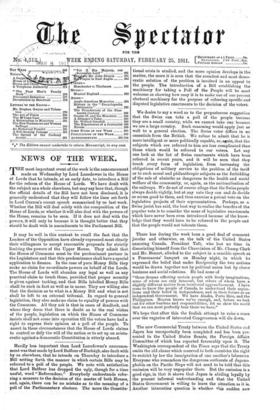It may be well in this context to recall the
fact that the Leaders of 'the Opposition have already expressed most clearly their willingness to accept reasonable proposals for strictly limiting the powers of the Upper House. They admit that the House of Commons must be the predominant partner in the Legislature and that this predominance shall have a special application to finance. In the case of pure Money Bills they make no claim for co-ordinate powers on behalf of the Lords. The House of Lords will abandon any legal as well as any practical claim to touch these, provided that proper security is given against tacking, and that Bills labelled Money Bills shall be such in fact as well as in name. They are willing also that the decision as to what is a Money Bill and what is not shall be left to an external tribunal. In regard to general legislation, they also make no claim to equality of powers with the Commons. All they ask is that in cases of deadlock, and where they deem that there is doubt as to the real wishes of the people, legislation on which the House of Commons insists shall not come into -operation till the voters have had a right to express their opinion at a poll of the people. To assert in these circumstances that the House of Lords claims to control or defy the will of the nation or to set up an aristo- cratic 'against a democratic ConstitUtion is utterly absurd.






































